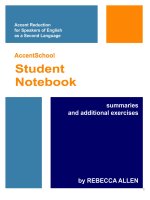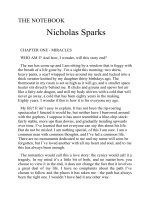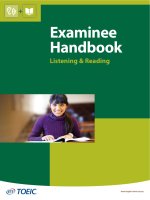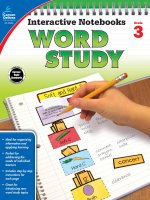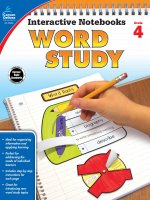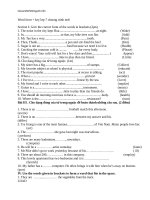Notebook ta7 sw 150dpi
Bạn đang xem bản rút gọn của tài liệu. Xem và tải ngay bản đầy đủ của tài liệu tại đây (10.79 MB, 72 trang )
ors,
we
~<+*;
ttt
‹
eg
)
D
p
Education Solutios
Unit 1:
Free Time
4-9
Unit 3: — Music and Arts
16-21
Unit 5:
28-33
| Food and Drinks
Unit 6: — Education
36-41
Unit 8:
Festivals around the World
48-53
Unit 10:
Energy Sources
60-65
Semester | Test
68-69
§ Vocabulary:
* collect soccer stickers
* make vlogs
© play online games.
* build models
* read comics
© bake cakes
Match each vocabulary item with its ngándefinition or description, then write the item several times on
e lines.
(v phr) /ka'lekt ‘soker ‘sttkerz/ suu tap nhan dan mơn
bóng đá
@—————play games on the Internet
(v phr) /brld 'mpdlz/ làm mơ hình
@———————
cook cakes in an oven with
extra fat or liquid
NY
build models
(v phr) /berk kerks/ làm bánh nướng
read children magazines that tell
stories through pictures
bake cakes
(v phr) /merk vlogz/ làm nhật ký về cuộc sống, công
việc dưới dạng video
@———————
make small copies of something
make vlogs
(v phr) /ri:d 'komiks/ đọc truyện tranh
(v phr) /pler ,pn lam
'germz/ chơi trò chơi trực tuyến
create blogs in which most of
the content is in the form of
videos
OY
bring together the sticky labels
with pictures of soccer players
Grammar:
Present
Simple for habits
We can use the Present Simple to talk about habits or things that happen regularly.
| collect stickers.
She reads comics.
| don’t make vlogs.
He doesn’t build models.
What do you do in your free time?
What does she do in her free time?
Do you play soccer? — Yes, | do./ No, | don't.
Does she bake cakes in her free time? — Yes, she does./ No, she doesn’t.
use the Present Simple to talk about habits or things that
happen regularly.
LỊ
LÌ
use the correct form of verbs in the Present Simple.
LÌ
LÌ
¬
how to make affirmative sentences in the Present Simple.
LÌ
L]
how to make negative sentences in the Present Simple.
LÌ
EL]
how to make interrogative sentences in the Present Simple.
⁄Z
Vocabulary:
* sport center
* theater
* market
© water park
* ice rink
* fair
Match each vocabulary item with its English definition or description, then write the item several times on
e lines.
(n) /‘spo:rts senter/ trung tam thé thao
an outside place where you
can ride on big machines
and play games
a place where you can ice
skate
an outdoor area where you
can enjoy playing in the
water
theater
(n) /‘ats rink/ san trugt bang
(
ỳ
a place where you go to
ice rink
TH
HH
HH
HH
buy things
HH nàn
a building where you go to
see plays
market
(n) /fer/ héi cho vui choi giải trí, chợ phiên
(
)
a building where you can
go bowling
YL)
(n) /‘beultn ‘eli/ san choi bowling
ceseuesesueeeesuesssnecessueesssuesssssecesineessniesssueessuutecsuseessnsecesneeeesneeeese
bowling alley
My notes:
a building where the public
can go to play many kinds
of sports, swim, etc.
Grammar:
Present Continuous for future plans
We use the Present Continuous to talk about future plans.
For I, we use am + V-ing.
For he/she/it or a singular noun, we use is + V-ing.
For we/you/they or a plural noun, we use are + V-ing.
I’m going to the sports center tonight.
She's playing soccer this evening.
They're going to the water park on Saturday.
I'm not going to the party on Sunday.
He isn’t playing basketball with us tonight.
They aren't playing soccer tomorrow.
Are you doing anything tonight?
> Yes, | am./ No, I'm not.
Is he going to the market tomorrow?
= Yes, he is./ No, he isn’t.
Are they going bowling tonight?
= Yes, they are./ No, they aren't.
My notes:
use the Present Continuous to talk about future plans.
LÌ
LÌ
LÌ
how to use to be with singular subjects and plural subjects.
L]
LÌ
how to use the Present Continuous in the interrogative, affirmative,
L]
L]
and negative form.
re
oS, Vocabulary:
* skateboarding
‹$⁄/
*zorbing
P/
* worth
e
IU
* surling
* rock climbing
® indoor cenler
* extreme sports
* safety equipment
Match each vocabulary item with its English definition or description, then write the item several times on
the lines.
(n) /'skertbo:
lrn/ môn (thé thao) trượt ván
KẾ
safe things that you need
for doing something
skateboarding
x
the sport in which somebody
is inside a large clear plastic
$
ball and rolls along the
ground or downhill
the sport of riding on
waves while standing on a
surfboard
(n) /zo:rbr/ trò lăn xuống dốc hoặc lăn trên mặt đất trong
một quả câu nhựa trong suôt
a place inside a building
where you can play sports
and do other activities
zorbing
(n) /ndo:r
'senter/ trung tâm các môn thé thao trong nha
O
the sport of climbing rock
surfaces
indoor center
(n) /tk,stri:m ‘spo:rts/ thé thao mao hiém
—..................................
(adj) Awa:r9/ đáng giá
©
good or useful enough to
do or have
¬—,
@
sports that are very exciting
and often dangerous to do
(n) /‘serfti 1 kwrpment/ thiét bi an toan
safety equipment
O
the sport of riding on a
skateboard
Put the parts of an invitation email in the correct order. Write 1-6 in the boxes.
LI|L ILILLILLIIL]
Give more details of the invitation.
Check your friend's availability.
Sign off.
Write the invitation.
Ask for a reply.
Start with a greeting.
My notes:
understand and know how to write an invitation email.
the steps to form a complete invitation email.
LÌ
LÌ
LÌ
LÌ
LÌ
“ Vocabulary:
* get some sleep
* drink soda
* unhealthy
(v phr) /get sam sli:p/ chop mat
* eat fruit and vegetables
* healthy
JS
O————
eat apples, carrots, etc.
===
{v phr) /i:t fru:t en 'vedzteblz// ăn trái cây và rau củ
well, not often sick; good for
your health
a
eat fruit and vegetables
(V phr) /drrnk 'seude/ uống nước xô-đa
@——
rest with your eyes closed
(adj) /helơi/ khoẻ mạnh, có lợi cho sức khoẻ
not well, often sick; not
good for your health
take in a sweet, flavored
drink with bubbles in it
unhealthy
My notes:
Grammar
Fill in the missing words to complete the rules.
we do something.
We use a little, not much, some and lots of to say
Use some and lots of with both
© Use a little and not much with
© Use don’t / doesn’t (verb)
Example:
I drink a little fruit juice every week.
He drinks lots of milk every week.
They don't do any exercise.
She doesn’t do much exercise.
and plural
nouns only.
to talk about things we don’t do.
nouns.
_Unit2
TT
để
&
ềÈ
"v,
S
Vocabulary:
© feel weak
* have a sore throat
* take medicine
* stay up late
* get some rest
* take vitamins
SN
* have a fever
* keep warm
Matchh each
each vocabulary item with its English definition or description, then write the item several times on
the lines.
Ϩ
(v phr) /fi:l wi:k/ co cam giac yéu
»
@—————
You have this when the front
part of your neck hurts.
-_
eta .. |
Teel weak
weak
(v phr) /heev e so:r Ôreut/ bị đau họng
eat or drink things that the
body needs to stay healthy
on
7"
a sore ner
throat
(v phr) /get sAm rest/ nghỉ ngơi
Your body is not powerful
or strong.
get some rest
ta
“take vitamins
relax, sleep, or do nothing
(v phr) /heev e 'fi:ver/ bị sốt
OF
go to bed later than usual
@
have a fever
=
(v phr) /terk 'medrsn/ uống thuốc
You need to do this when
the weather is cold.
take medicine
(v phr) /ster Ap lert/ thức khuya.
Your body is too hot
because you are sick.
~~ stay
stay up
up late
(v phr) /ki:p wo:rm/ giữ ấm
You do this, or your doctor
ask you to, when you are
sick.
My notes:
Grammar:
Should/ Shouldn’t
We use should + bare infinitive or shouldn’t + bare infinitive to give advice. We can use should to ask for advice.
Example:
You should eat fresh fruit.
He shouldn't eat fast food.
| have a sore throat. What should | do?
Should | take some medicine?
= Yes, you should./ No, you shouldn't.
My notes:
use should to ask for advice.
shouldn’t + bare infinitive.
LÌ
LÌ
LÌ
LÌ
Vocabulary:
* brain food
* provide
© smoothie
* salad
* cafeteria
* trouble
© nut
7
Match each vocabulary item with its English definition or description, then write the item several times on
the lines.
(n) /‘bretn fu:d/ thực phẩm tốt cho não
(
)
a thick, smooth drink made
of fruit and/or vegetables
mixed
—
brain food
(n) /‘smu:éi/ sinh t6
C 3
a dry fruit that has a hard
outside part
smoothie
(n)/ køœfe'trrie/ căng tin, quán ăn tự phục vụ
(
ỳ
food that helps you study
better
(n) /nat/ hat
a restaurant where you can
choose and pay for your
meal then carry it to the table
(v) /pre'vard/ cung cấp
C
a dish of cold vegetables
mixed
(n)/'sœled/ món xà lách (rau, củ trộn)
O
a difficulty or problem
QC
(n) /'trabl/ van đề rắc rối, khó khăn
¢ >
give something to someone
who needs it
trouble
Wilting Notes:
Put the parts of a request letter in the correct order. Write 1-7 in the boxes.
LI|LTILIILIILLIILLIIL]
Ask the reader to do something.
Write a greeting.
Introduce the problem.
Finish the letter with a farewell and your name.
Write your address at the top and the receiver's address below.
Give useful solutions.
Say who you are and why are you writing.
My notes:
understand and know how to write a request letter.
the steps to form a complete request letter.
LÍ
LÌ
LÌ
LÌ
LÌ
oo
( Uni
t3
Music anal Ags)
Vocabulary:
â jazz
* pop
* classical music *đ rock
* hip hop
* country music
Match each vocabulary item with its English definition or description, then write the item several times on
the lines.
(n) /dzœz/ nhạc jazz
O
modern music that is most popular
among young people
(n) /ppp/ nhac pop
+
music in a Western musical
tradition with instruments that are
not electronic
{n) /hrp hop/ nhạc hip hop
€ 3
a type of music with strong rhythms
a type of popular music in the style
of the traditional music
Xa
classical music
(n) /rok/ nhac rock
O-_
a type of dance music with a
strong beat and spoken words,
played on electronic instruments
(n) /kantri mju:zrk/ nhạc đồng quê
——
a type of music with a strong beat
-
country music
My note:
S==—==——ễễ
Grammar:
We use the Present Simple to talk about things that we consider as facts (such as likes and dislikes) or are true for a
long time.
Subject + verb (-s/-es) + (object)
| like jazz. / He likes hip hop.
Subject + don’t/ doesn’t + verb + (object)
They don’t like listening to rock./ She doesn’t like listening to classical music.
Do/ Does + subject + verb + (object)?
Does he enjoy listening to jazz? > Yes, he does./ No, he doesn’t.
Do you listen to music every day? > Yes, | do./ No, | don’t.
understand and use the Present Simple to talk about things
that we consider as facts (such as likes and dislikes) or are
L]
L]
L]
true for a long time.
when to add -s/-es to verbs in the Present Simple affirmative form.
when to use and where to put do/does in the Present Simple interrogative form.
LÌ
( Unit3
\
Music anil cats:
é
“&
“ Vocabulary:
* electronic
* blues
* reggae
* heavy metal
* folk music
© RnB (Rhythm and Blues)
Match each vocabulary item with its English definition or description, then write the item several times on
the lines.
(n) /r,lek'tronrk/ nhạc điện tử
ŒŒ
a kind of loud rock music
SS
electronic
(n) /,hevi ‘metl/ nhac heavy metal (một loại nhạc.
rock có nhịp điệu mạnh và dữ dội)
O—_—_—_—__——
type of music that is a mixture of
blues and jazz and has a strong
rhythm
heavy metal
(n) /'reger/ nhạc reggae (một dịng nhạc có xuất xứ€——
từ Jamaica)
music made with computers
reggae
traditional music of a country
——ễEEễễễ
(n) /feuk mịu:z1k/ nhạc dân ca
OF
a type of Caribbean popular music
(n)/.a:ren bi: - rrðem en 'blu:z/ nhac RnB
OF
a type of slow, sad music with a
strong rhythm
RnB (Rhythm and
Blues)
My notes:
TC.cessnusnuonuonuonuonuonuonnonhnrhnunusuusnusuunnnnsnssnssnssnaiŸ
Grammer:)
Prepositions of time (in, on, at)
© Use in with parts of the day, months, season, and years: in the morning, in January, in the spring, in 2021
© Use on with days and dates: on Wednesday, on the weekend, on February 1*, on Christmas
© Use ai for times of the day and meals: at 10 p.m., at three o'clock, at breakfast
© We also say: at night, at noon, etc.
Possessive adjectives
* Use possessive adjectives to express possesion.
© Use possessive adjectives with nouns.
|
my
you
your
we
our
they
their
he
his
she
her
it
its
Example: my song, his band, their show
My notes:
understand and use prepositions of time to talk about time.
LÍ
LÌ
LÌ
( Unit3
\_
C4
Musie
anal
ris
È
Nocobeliny:
* conclusion
ey
* surprise
* description
)
*
plot
® settin:
. Si
* fantasy
. ate
JS
Match each vocabulary item with its English defi ition or description, then write the item several times on
the lines.
©
(n)
"
Iken’klu:3n/
IKen'Klucgn/
két
ủa
phim, truyệt
ket cue (etia phim,
truyện)
the feeling that you have
when something happens
suddenly that you didn’t
°
_“=
expect
CEU
(n) /pIpt/ cốt truyện, nội dung phim/kich
€
something that someone
does that is against the law
(n) /'setrn/ bối cảnh
€*
very bad
words that tell what someone
or something is like or what
happened
surprise
(n) /kratm/ téi ac, hanh vi pham phap
5
OO
nice that you
think about and that you
ca
hope will happen, although
it’s very unlikely
we
{adj) /'terebl/ khủng khiếp, kinh hoàng
ng
(
)
the end of a piece of
writing
———_
terrible
{n) /dr skrrpƒn/ mơ tả
©
what happens in a story
(n) /‘feentasi/ (thé giới) giả tưởng
©
the place where something
is or the time when
something happens
My notes:
Writing) Notes:
Put the descriptions into the correct columns.
© Write a short description of what happens to the star(s) or what they have to do.
* Give the name of the movie.
© Talk about the type of movie, the setting, and the main star(s).
* Give your opinion of the movie and say who you think will like it.
* Describe the good and/ or bad parts of the movie (the way it looks/ the music/ the acting).
My notes:
understand and know how to write a movie description.
the steps to form a complete movie description.
LÌ
LÌ
LÌ
L]
LÌ
Vocabulary:
Co im LI
Services
ey
* car wash
*bake sale
* talent show — ¢ fun run
* crofifair
Match each vocabulary item with its English definition or description, then write the item several times on
the lines.
(n) /'kq:r wd:ƒ/ việc rửa xe ô-tô
(
ỳ
an activity where people run
to raise money for charity
—.
car wash
(n) /‘berk setl/ việc bán bánh nướng
(n) /kreeft fer/ héi cho ban đồ thủ công, mĩ nghệ
an event where people sell
decorative objects that they
make by hand
a place with special
equipment, where you can
pay to have your car washed
(n) /†ølent ƒeu/ buổi biểu diễn tài năng
an event where people bake
cakes, etc. and sell to make
money for charity
a show or event in which
people compete to show
how well they can sing,
dance, etc.
We use should, let's, how about to make suggestions, and offer ideas or plans for someone to think about.
¢ should + bare infinitive (We should put “Run for Fun” on the poster.)
@ Let's (not) + bare infinitive (Let’s have a fun run./ Let's not argue about this.)
© How about + V-ing? (How about organizing a craft fair?)
© How about + subject + verb (Present Simple)? (How about we organize a bake sale?)
Let's (not) + bare infinitive
How about + V-ing?
How about + subject + verb (Present Simple)?
LÌ
LÍ
LILILIL]
should + bare infinitive
LÌ
LILILILI
understand and use should, let's, how about to make
suggestions, and offer ideas or plans for someone to think
about.
(Unit4
\
số die
Community Services wwgy ee
>
°
* raise
|
* clean up
* plant
Match each vocabulary item with its English definition or description, then write the item several times on
the lines.
(V)/.ri: sarkl/ tái chế
€Œ
mm
collect money, usually for charity
_
recycle
(v) /rerz/ gây (quỹ), góp (tiền)
O--_
give something, especially money, to
people who need it
(V) /pIent/ trồng
remove dirt from something
do something to materials like
paper and glass so that we can
use them again
(phr v) /kli:n Ap/ quét dọn
OF
put seeds in the ground
Grammar:
Past Simple
regular verbs
We use the Past Simple to talk about an action that started and finished in the past.
We often say when it happened, e.g. yesterday, last night, three days ago.
We can put the time marker at the beginning or the end of a sentence.
Example:
Last month, we raised money to help the local charity.
He donated some books last weekend.
Did you volunteer at a soup kitchen?
Yes, I did./ No, I didn’t,
We didn’t donate books. We donated clothes.
When did you volunteer at the soup kitchen?
‘a
>)
My notes:
2
UL
understand and use the Past Simple with regular verbs to
talk about an action that started and finished in the past.
make Past Simple sentences in the affirmative, negative,
and interrogative form.
to put the time marker at the beginning or the end of a
sentence.
LÌ
LÌ
ri
FT]
LÌ
LÌ
LÌ
LÌ
P|
LÌ
LÌ

